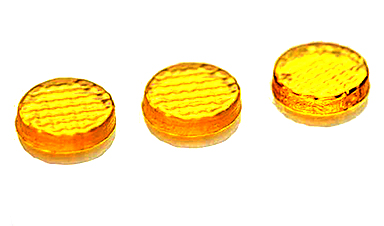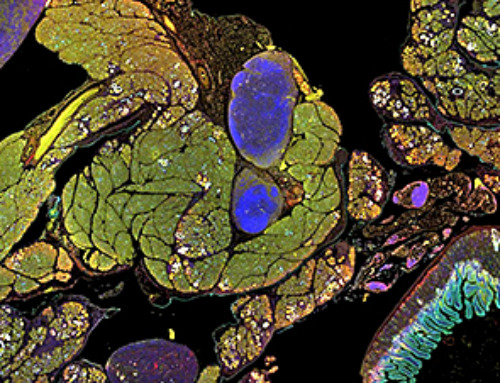A new technique for 3D printing medication has enabled the printing of multiple drugs in a single tablet, paving the way for personalized pills that can deliver timed doses.
Researchers from the University of Nottingham’s, Centre for Additive Manufacturing have led research alongside the School of Pharmacy that has fabricated personalized medicine using Multi-Material InkJet 3D Printing (MM-IJ3DP). The research has been published in Materials Today Advances.
The team have developed a cutting-edge method that enables the fabrication of customized pharmaceutical tablets with tailored drug release profiles, ensuring more precise and effective treatment options for patients.
Using Multi-Material InkJet 3D Printing (MM-IJ3DP), tablets can be printed that release drugs at a controlled rate, determined by the tablet‘s design. This is made possible by a novel ink formulation based on molecules that are sensitive to ultraviolet light. When printed, these molecules form a water-soluble structure.
The drug release rate is controlled by the unique interior structure of the tablet, allowing for timing the dosage release. This method can print multiple drugs in a single tablet, allowing for complex medication regimens to be simplified into a single dose.
Dr. Yinfeng He, Assistant Professor in the Faculty of Engineering’s Centre for Additive Manufacturing led the research, he said, “This is an exciting step forwards in the development of personalized medication. This breakthrough not only highlights the potential of 3D printing in revolutionizing drug delivery but also opens up new avenues for the development of next-generation personalized medicines.”
“While promising, the technology faces challenges, including the need for more formulations that support a wider range of materials. The ongoing research aims to refine these aspects, enhancing the feasibility of MM-IJ3DP for widespread application,” Professor Ricky Wildman added.
This technology will be particularly beneficial in creating medication that needs to release drugs at specific times, making it ideal for treating diseases, where timing and dosage accuracy are crucial. The ability to print 56 pills in a single batch demonstrates the scalability of this technology, providing a strong potential for the production of personalized medicines.
Professor Felicity Rose at the University of Nottingham’s School of Pharmacy was one of the co-authors on the research, she says, “The future of prescribed medication lies in a personalized approach, and we know that up 50% of people in the UK alone don’t take their medicines correctly and this has an impact on poorer health outcomes with conditions not being controlled or properly treated. A single pill approach would simplify taking multiple medications at different times and this research is an exciting step towards that.”
More information: Geoffrey Rivers et al, Enabling high-fidelity personalised pharmaceutical tablets through multimaterial inkjet 3D printing with a water-soluble excipient, Materials Today Advances (2024). DOI: 10.1016/j.mtadv.2024.100493
Provided by University of Nottingham
News
Studies detail high rates of long COVID among healthcare, dental workers
Researchers have estimated approximately 8% of Americas have ever experienced long COVID, or lasting symptoms, following an acute COVID-19 infection. Now two recent international studies suggest that the percentage is much higher among healthcare workers [...]
Melting Arctic Ice May Unleash Ancient Deadly Diseases, Scientists Warn
Melting Arctic ice increases human and animal interactions, raising the risk of infectious disease spread. Researchers urge early intervention and surveillance. Climate change is opening new pathways for the spread of infectious diseases such [...]
Scientists May Have Found a Secret Weapon To Stop Pancreatic Cancer Before It Starts
Researchers at Cold Spring Harbor Laboratory have found that blocking the FGFR2 and EGFR genes can stop early-stage pancreatic cancer from progressing, offering a promising path toward prevention. Pancreatic cancer is expected to become [...]
Breakthrough Drug Restores Vision: Researchers Successfully Reverse Retinal Damage
Blocking the PROX1 protein allowed KAIST researchers to regenerate damaged retinas and restore vision in mice. Vision is one of the most important human senses, yet more than 300 million people around the world are at [...]
Differentiating cancerous and healthy cells through motion analysis
Researchers from Tokyo Metropolitan University have found that the motion of unlabeled cells can be used to tell whether they are cancerous or healthy. They observed malignant fibrosarcoma cells and [...]
This Tiny Cellular Gate Could Be the Key to Curing Cancer – And Regrowing Hair
After more than five decades of mystery, scientists have finally unveiled the detailed structure and function of a long-theorized molecular machine in our mitochondria — the mitochondrial pyruvate carrier. This microscopic gatekeeper controls how [...]
Unlocking Vision’s Secrets: Researchers Reveal 3D Structure of Key Eye Protein
Researchers have uncovered the 3D structure of RBP3, a key protein in vision, revealing how it transports retinoids and fatty acids and how its dysfunction may lead to retinal diseases. Proteins play a critical [...]
5 Key Facts About Nanoplastics and How They Affect the Human Body
Nanoplastics are typically defined as plastic particles smaller than 1000 nanometers. These particles are increasingly being detected in human tissues: they can bypass biological barriers, accumulate in organs, and may influence health in ways [...]
Measles Is Back: Doctors Warn of Dangerous Surge Across the U.S.
Parents are encouraged to contact their pediatrician if their child has been exposed to measles or is showing symptoms. Pediatric infectious disease experts are emphasizing the critical importance of measles vaccination, as the highly [...]
AI at the Speed of Light: How Silicon Photonics Are Reinventing Hardware
A cutting-edge AI acceleration platform powered by light rather than electricity could revolutionize how AI is trained and deployed. Using photonic integrated circuits made from advanced III-V semiconductors, researchers have developed a system that vastly [...]
A Grain of Brain, 523 Million Synapses, Most Complicated Neuroscience Experiment Ever Attempted
A team of over 150 scientists has achieved what once seemed impossible: a complete wiring and activity map of a tiny section of a mammalian brain. This feat, part of the MICrONS Project, rivals [...]
The Secret “Radar” Bacteria Use To Outsmart Their Enemies
A chemical radar allows bacteria to sense and eliminate predators. Investigating how microorganisms communicate deepens our understanding of the complex ecological interactions that shape our environment is an area of key focus for the [...]
Psychologists explore ethical issues associated with human-AI relationships
It's becoming increasingly commonplace for people to develop intimate, long-term relationships with artificial intelligence (AI) technologies. At their extreme, people have "married" their AI companions in non-legally binding ceremonies, and at least two people [...]
When You Lose Weight, Where Does It Actually Go?
Most health professionals lack a clear understanding of how body fat is lost, often subscribing to misconceptions like fat converting to energy or muscle. The truth is, fat is actually broken down into carbon [...]
How Everyday Plastics Quietly Turn Into DNA-Damaging Nanoparticles
The same unique structure that makes plastic so versatile also makes it susceptible to breaking down into harmful micro- and nanoscale particles. The world is saturated with trillions of microscopic and nanoscopic plastic particles, some smaller [...]
AI Outperforms Physicians in Real-World Urgent Care Decisions, Study Finds
The study, conducted at the virtual urgent care clinic Cedars-Sinai Connect in LA, compared recommendations given in about 500 visits of adult patients with relatively common symptoms – respiratory, urinary, eye, vaginal and dental. [...]





















